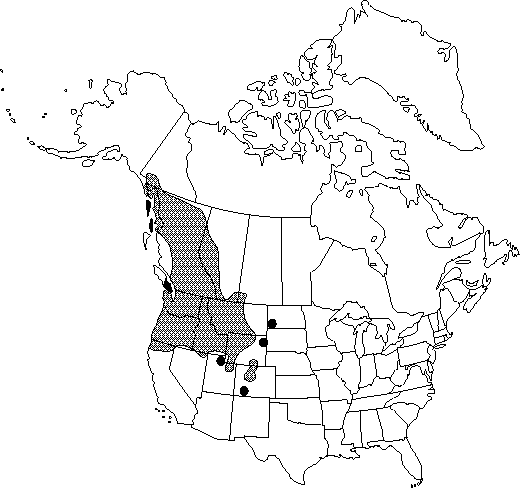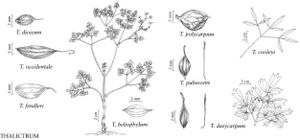Difference between revisions of "Thalictrum occidentale"
Proc. Amer. Acad. Arts 8: 372. 1873.
FNA>Volume Importer |
imported>Volume Importer |
||
| (7 intermediate revisions by 2 users not shown) | |||
| Line 13: | Line 13: | ||
}}{{Treatment/ID/Special_status | }}{{Treatment/ID/Special_status | ||
|code=F | |code=F | ||
| − | |label= | + | |label=Illustrated |
}} | }} | ||
|basionyms= | |basionyms= | ||
|synonyms={{Treatment/ID/Synonym | |synonyms={{Treatment/ID/Synonym | ||
| − | |name= | + | |name=Thalictrum occidentale var. macounii |
|authority=B. Boivin | |authority=B. Boivin | ||
| − | }}{{Treatment/ID/Synonym | + | |rank=variety |
| − | |name= | + | }} {{Treatment/ID/Synonym |
| + | |name=Thalictrum occidentale var. palousense | ||
|authority=H. St. John | |authority=H. St. John | ||
| + | |rank=variety | ||
}} | }} | ||
|hierarchy=Ranunculaceae;Thalictrum;Thalictrum sect. Heterogamia;Thalictrum occidentale | |hierarchy=Ranunculaceae;Thalictrum;Thalictrum sect. Heterogamia;Thalictrum occidentale | ||
| Line 30: | Line 32: | ||
}}<!-- | }}<!-- | ||
| − | --><span class="statement" id="st- | + | --><span class="statement" id="st-undefined" data-properties=""><b>Roots </b>yellow to medium brown or black, thin, fibrous. <b>Stems</b> erect, 30-100(-120) dm, glabrous, often from well-developed rhizomes. <b>Leaves</b> mostly cauline. <b>Leaf</b> blade 3-4×-ternately compound; leaflets orbiculate to obovate-cuneate or cordate, apically 3-lobed, 10-30 mm wide, lobe margins coarsely crenate, surfaces glabrous to glandular. <b>Inflorescences</b> terminal (some flowers in axils of distal leaves), panicles, rather open, many flowered. <b>Flowers</b>: sepals whitish or greenish or purplish tinged, ovate, 3.5-4.4 mm in staminate flowers, 1.5-2 mm in pistillate flowers; filaments purplish, 4-10 mm; anthers 1.5-4 mm, long-apiculate; stigma often purplish. <b>Achenes</b> 6-9, spreading to reflexed, short-stipitate; stipe 0.4-1.2 mm; body fusiform, not laterally compressed, (4-)6-9(-10) mm, tapering at both ends, glandular, strongly 3-veined on each side, veins not anastomosing; beak 3-4.5(-6) mm.</span><!-- |
-->{{Treatment/Body | -->{{Treatment/Body | ||
| Line 37: | Line 39: | ||
|elevation=200-3400 m | |elevation=200-3400 m | ||
|distribution=Alta.;B.C.;Sask.;Yukon;Alaska;Calif.;Colo.;Idaho;Mont.;Nev.;N.Dak.;Oreg.;Utah;Wash.;Wyo. | |distribution=Alta.;B.C.;Sask.;Yukon;Alaska;Calif.;Colo.;Idaho;Mont.;Nev.;N.Dak.;Oreg.;Utah;Wash.;Wyo. | ||
| − | |discussion=<p>Thalictrum occidentale is similar to T. confine and T. venulosum; thorough field studies are needed to determine whether or not they should be maintained as separate species. Thalictrum occidentale can usually be distinguished by its reflexed achenes.</p><!-- | + | |discussion=<p><i>Thalictrum occidentale</i> is similar to <i>T. confine</i> and <i>T. venulosum</i>; thorough field studies are needed to determine whether or not they should be maintained as separate species. <i>Thalictrum occidentale</i> can usually be distinguished by its reflexed achenes.</p><!-- |
| − | --><p>Plants of northern British Columbia, sometimes called Thalictrum occidentale var. breitungii (B. Boivin) Brayshaw, appear to be intermediate between T. occidentale and T. venulosum (T. C. Brayshaw, pers. comm.); achenes are ascending, ± compressed, and beaks rather short (2-4 mm) (T. C. Brayshaw 1989).</p><!-- | + | --><p>Plants of northern British Columbia, sometimes called <i>Thalictrum occidentale</i> var. breitungii (B. Boivin) Brayshaw, appear to be intermediate between <i>T. occidentale</i> and <i>T. venulosum</i> (T. C. Brayshaw, pers. comm.); achenes are ascending, ± compressed, and beaks rather short (2-4 mm) (T. C. Brayshaw 1989).</p><!-- |
| − | --><p>Some of the Native Americans used Thalictrum occidentale medicinally for headaches, eye trouble, and sore legs, to loosen phlem, and to improve blood circulation (D. E. Moerman 1986).</p> | + | --><p>Some of the Native Americans used <i>Thalictrum occidentale</i> medicinally for headaches, eye trouble, and sore legs, to loosen phlem, and to improve blood circulation (D. E. Moerman 1986).</p> |
|tables= | |tables= | ||
|references= | |references= | ||
| Line 48: | Line 50: | ||
-->{{#Taxon: | -->{{#Taxon: | ||
name=Thalictrum occidentale | name=Thalictrum occidentale | ||
| − | |||
|authority=A. Gray | |authority=A. Gray | ||
|rank=species | |rank=species | ||
|parent rank=section | |parent rank=section | ||
| − | |synonyms= | + | |synonyms=Thalictrum occidentale var. macounii;Thalictrum occidentale var. palousense |
|basionyms= | |basionyms= | ||
|family=Ranunculaceae | |family=Ranunculaceae | ||
| Line 62: | Line 63: | ||
|publication title=Proc. Amer. Acad. Arts | |publication title=Proc. Amer. Acad. Arts | ||
|publication year=1873 | |publication year=1873 | ||
| − | |special status=Endemic; | + | |special status=Endemic;Illustrated |
| − | |source xml=https:// | + | |source xml=https://bitbucket.org/aafc-mbb/fna-data-curation/src/2e0870ddd59836b60bcf96646a41e87ea5a5943a/coarse_grained_fna_xml/V3/V3_982.xml |
|genus=Thalictrum | |genus=Thalictrum | ||
|section=Thalictrum sect. Heterogamia | |section=Thalictrum sect. Heterogamia | ||
|species=Thalictrum occidentale | |species=Thalictrum occidentale | ||
| − | |||
| − | |||
| − | |||
| − | |||
| − | |||
| − | |||
| − | |||
| − | |||
| − | |||
| − | |||
| − | |||
| − | |||
| − | |||
| − | |||
| − | |||
| − | |||
| − | |||
| − | |||
| − | |||
| − | |||
| − | |||
| − | |||
| − | |||
| − | |||
| − | |||
| − | |||
| − | |||
| − | |||
| − | |||
| − | |||
| − | |||
| − | |||
| − | |||
| − | |||
| − | |||
| − | |||
| − | |||
| − | |||
}}<!-- | }}<!-- | ||
-->[[Category:Treatment]][[Category:Thalictrum sect. Heterogamia]] | -->[[Category:Treatment]][[Category:Thalictrum sect. Heterogamia]] | ||
Latest revision as of 21:52, 5 November 2020
Roots yellow to medium brown or black, thin, fibrous. Stems erect, 30-100(-120) dm, glabrous, often from well-developed rhizomes. Leaves mostly cauline. Leaf blade 3-4×-ternately compound; leaflets orbiculate to obovate-cuneate or cordate, apically 3-lobed, 10-30 mm wide, lobe margins coarsely crenate, surfaces glabrous to glandular. Inflorescences terminal (some flowers in axils of distal leaves), panicles, rather open, many flowered. Flowers: sepals whitish or greenish or purplish tinged, ovate, 3.5-4.4 mm in staminate flowers, 1.5-2 mm in pistillate flowers; filaments purplish, 4-10 mm; anthers 1.5-4 mm, long-apiculate; stigma often purplish. Achenes 6-9, spreading to reflexed, short-stipitate; stipe 0.4-1.2 mm; body fusiform, not laterally compressed, (4-)6-9(-10) mm, tapering at both ends, glandular, strongly 3-veined on each side, veins not anastomosing; beak 3-4.5(-6) mm.
Phenology: Flowering early summer-mid summer (Jun–Aug).
Habitat: Open woods, meadows, and copses
Elevation: 200-3400 m
Distribution

Alta., B.C., Sask., Yukon, Alaska, Calif., Colo., Idaho, Mont., Nev., N.Dak., Oreg., Utah, Wash., Wyo.
Discussion
Thalictrum occidentale is similar to T. confine and T. venulosum; thorough field studies are needed to determine whether or not they should be maintained as separate species. Thalictrum occidentale can usually be distinguished by its reflexed achenes.
Plants of northern British Columbia, sometimes called Thalictrum occidentale var. breitungii (B. Boivin) Brayshaw, appear to be intermediate between T. occidentale and T. venulosum (T. C. Brayshaw, pers. comm.); achenes are ascending, ± compressed, and beaks rather short (2-4 mm) (T. C. Brayshaw 1989).
Some of the Native Americans used Thalictrum occidentale medicinally for headaches, eye trouble, and sore legs, to loosen phlem, and to improve blood circulation (D. E. Moerman 1986).
Selected References
None.
